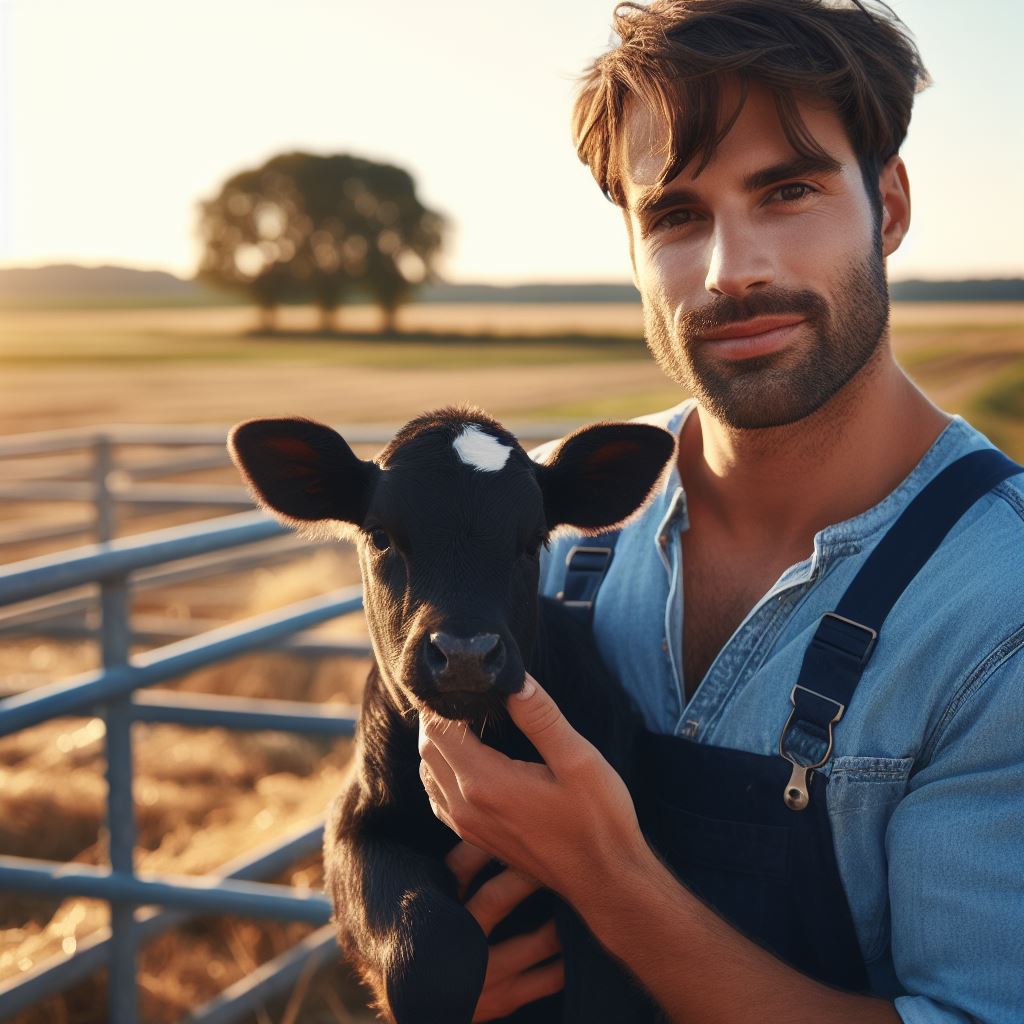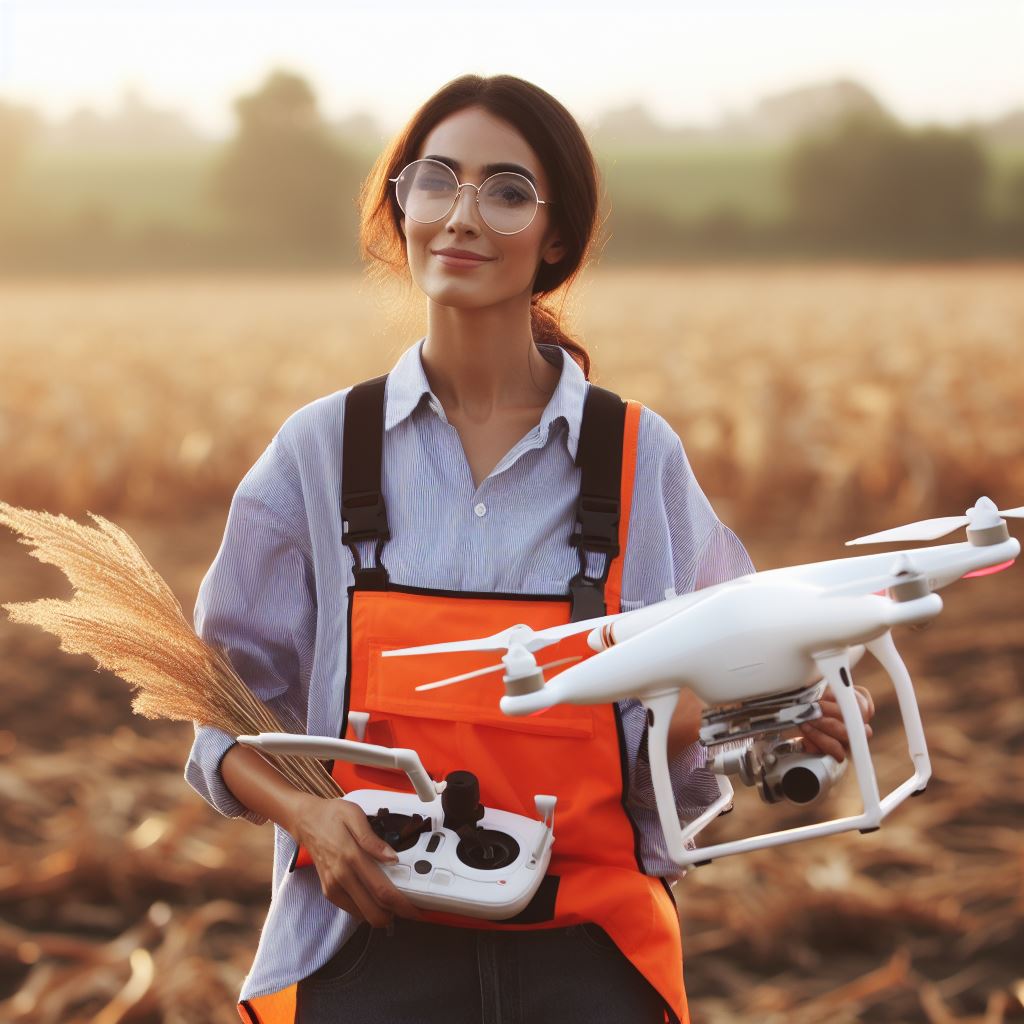Introduction
Animal breeding involves the selection and mating of animals for desired traits. Animal breeders play a vital role in improving species and producing high-quality livestock.
This blog post aims to provide an overview of the animal breeder career in the USA.
Animal breeding is the practice of selectively mating animals to produce offspring with desired traits.
Animal breeders in the USA play a crucial role in enhancing the genetic characteristics of various species, including livestock, pets, and laboratory animals.
Their work involves studying genetics, evaluating traits, and making informed decisions to maximize desired outcomes.
Animal breeders are important contributors to the agricultural industry, as their efforts result in improved productivity, disease resistance, and overall animal welfare.
They contribute to a healthier and genetically superior livestock supply, improving food production and economic stability by selectively mating animals with desirable traits.
The purpose of this blog post is to shed light on the animal breeder career in the USA.
It will provide insights into the duties, educational requirements, and skills needed to excel in this field.
Additionally, it will highlight the challenges and rewards of being an animal breeder, as well as the potential career paths and opportunities available within the industry.
Whether it’s breeding dogs for specific traits, developing new crop varieties, or working with conservation organizations, animal breeding offers a diverse range of roles and opportunities in the USA.
This blog post aims to inform and inspire individuals interested in pursuing a career as an animal breeder, emphasizing the importance of their role in shaping the future of various species and industries.
Educational Requirements
In order to pursue a career as an animal breeder in the USA, there are certain educational requirements that need to be fulfilled.
These requirements play an important role in acquiring the necessary knowledge and skills to succeed in this field.
High school diploma or equivalent
One of the basic educational requirements for becoming an animal breeder is a high school diploma or its equivalent.
This level of education provides individuals with a solid foundation in various subjects that are essential for understanding the principles of animal breeding.
Pursuing a bachelor’s degree in animal science or a related field
While a high school diploma is the minimum requirement, most animal breeders choose to pursue higher education.
A bachelor’s degree in animal science or a related field is highly recommended.
This degree program covers a wide range of subjects such as genetics, reproduction, nutrition, and animal health.
Additional certifications or specialized training
In addition to a bachelor’s degree, it is beneficial for animal breeders to obtain additional certifications or specialized training.
These certifications or training programs provide individuals with in-depth knowledge and expertise in specific areas of animal breeding.
Transform Your Career Today
Unlock a personalized career strategy that drives real results. Get tailored advice and a roadmap designed just for you.
Start NowSome examples include certifications in equine reproduction, canine genetics, or dairy cattle management.
By acquiring these additional qualifications, animal breeders can enhance their skill set and increase their chances of obtaining better job opportunities.
Employers often prefer candidates who have gone the extra mile to gain specialized knowledge and expertise.
To become an animal breeder in the USA, you need a high school diploma, a bachelor’s degree in animal science, and extra certifications or specialized training.
These educational prerequisites provide individuals with the necessary knowledge and skills to excel in their careers as animal breeders.
It is important for aspiring animal breeders to pursue higher education and continuously update their knowledge through certifications or specialized training programs.
Job Responsibilities
A career in animal breeding involves a wide range of responsibilities that contribute to the successful breeding and reproduction of animals.
These responsibilities include:
Selecting and pairing animals for reproduction
One of the primary responsibilities of an animal breeder is to carefully select and pair animals for the purpose of reproduction.
This involves considering various factors such as genetic traits, health history, and temperament to ensure the production of healthy and desirable offspring.
Animal breeders must have a deep understanding of different breeds and species, as well as the specific characteristics and traits that need to be preserved or improved through selective breeding.
Monitoring health and nutrition of animals
Animal breeders are also responsible for closely monitoring the health and nutrition of the animals under their care.
They must ensure that the animals are provided with proper nutrition, vaccinations, and regular check-ups to maintain their overall well-being.
Identifying and addressing any health issues or diseases promptly is crucial to prevent the spread of illnesses and maintain the quality of the breeding stock.
Implementing breeding techniques and strategies
Animal breeders utilize various breeding techniques and strategies to achieve their breeding goals.
They must stay updated with the latest advancements in reproductive technologies and genetic research to effectively manage breeding programs.
These techniques may include artificial insemination, embryo transfer, or genetic selection to enhance desired traits or eliminate undesirable ones.
Implementing these techniques requires precision and knowledge to achieve the desired outcomes.
Maintaining records and pedigrees
Accurate record-keeping is an essential part of an animal breeder’s responsibilities.
They must maintain detailed records of breeding histories, pedigrees, genetic information, and any other relevant data.
Transform Your Career Today
Unlock a personalized career strategy that drives real results. Get tailored advice and a roadmap designed just for you.
Start NowThese records not only help in tracking the lineage and genetic traits of animals but also assist in making informed decisions regarding future breeding plans and pairings.
Ensuring compliance with regulations and ethical guidelines
An animal breeder must adhere to strict regulations and ethical guidelines governing the industry.
This includes following guidelines related to animal welfare, ensuring proper documentation, and complying with licensing requirements.
They must stay informed about any changes in regulations and adapt their practices accordingly to ensure the highest standards of care and ethical breeding practices.
In general, the role of an animal breeder is multifaceted and requires a broad range of skills and knowledge.
From selectively pairing animals for reproduction to implementing advanced breeding techniques, maintaining health records, and upholding ethical standards, animal breeders play a crucial role in the responsible breeding of animals.
Read: Day in the Life: Following a US Animal Breeder
Career Prospects
Demand for animal breeders in various industries
- Animal breeders are in high demand in industries such as agriculture, pet breeding, and zoos.
- They play a crucial role in improving animal traits and maintaining the genetic diversity of different species.
- With the increasing global population, the need for animal products and companionship is also rising.
- This leads to a greater demand for animal breeders who can produce high-quality breeds and ensure the overall health and welfare of the animals
- Animal breeders are also sought after for their knowledge and skills in managing breeding programs.
Opportunities for advancement and specialization
- Animal breeders have ample opportunities for career advancement and specialization.
- They can further their education and specialize in specific animal species or breeds.
- By gaining expertise in a particular area, such as horse breeding or avian genetics, breeders can access higher-paying jobs.
- Advancement in the field can also come in the form of managerial positions or starting their own breeding businesses.
- Animal breeders can collaborate with researchers and scientists to develop new breeding techniques.
Salary potential and job outlook
- Animal breeders can earn a competitive salary, depending on factors such as experience, location, and specialization.
- According to the U.S. Bureau of Labor Statistics, the median annual wage for animal breeders is around $36,080.
- However, breeders who work with high-value breeds or in specialized industries can earn significantly more.
- Furthermore, the job outlook for animal breeders is promising, with a projected growth rate of 1% from 2020 to 2030.
- The demand for animal breeders is expected to remain steady as the need for livestock and companion animals continues to rise.
Generally, a career as an animal breeder offers a wide range of prospects, including high demand in various industries, opportunities for advancement and specialization, and a competitive salary.
Animal breeders play a vital role in improving animal traits and maintaining genetic diversity.
With the increasing global population, the need for animal products and companionship is on the rise, leading to a greater demand for skilled breeders.
Additionally, breeders can advance their careers through education, specialization, and collaboration with researchers to develop innovative breeding techniques.
The salary potential for animal breeders is competitive, with opportunities for higher earnings through working with high-value breeds or in specialized industries.
The job outlook for animal breeders is promising, with a steady growth rate projected for the next decade.
Overall, the animal breeder career in the USA offers a rewarding and fulfilling path for individuals passionate about animals and genetics.
Read: Challenges Faced by Modern US Animal Breeders

Skills and Qualities
- Knowledge of animal anatomy, genetics, and reproductive processes
- Strong observational and problem-solving skills
- Ability to work with diverse animal species
- Good communication and interpersonal skills
A successful animal breeder in the USA possesses a wide range of skills and qualities that are essential for the job.
These attributes enable them to effectively carry out breeding programs and ensure the health and well-being of the animals under their care.
Knowledge of animal anatomy, genetics, and reproductive processes
Animal breeders must have a solid understanding of animal anatomy, genetics, and reproductive processes to make informed decisions when selecting breeding pairs.
They need to be familiar with the different breeds and species, their unique characteristics, and genetic predispositions.
This knowledge allows them to create breeding programs that aim to produce offspring with specific traits or improve the overall health of the breed.
Transform Your Career Today
Unlock a personalized career strategy that drives real results. Get tailored advice and a roadmap designed just for you.
Start NowStrong observational and problem-solving skills
Observational skills are crucial for animal breeders as they need to closely monitor the health, behavior, and development of animals in their care.
They must be able to detect signs of illness or behavioral issues and take appropriate action swiftly.
Additionally, problem-solving skills are essential for resolving any challenges that may arise during the breeding process, such as breeding failures or genetic abnormalities.
Ability to work with diverse animal species
Animal breeders work with a wide variety of animal species, ranging from dogs and cats to livestock and exotics.
They must adapt their knowledge and techniques to suit the specific needs and breeding behaviors of each species.
This requires a deep understanding of the unique requirements, reproductive cycles, and breeding methods for each animal group.
Good communication and interpersonal skills
Effective communication is vital when working as an animal breeder. They need to collaborate and coordinate with veterinarians, fellow breeders, and potential buyers.
Clear and concise communication ensures that the breeding goals and expectations are understood by all parties involved.
Additionally, good interpersonal skills are valuable for building strong relationships with clients and maintaining a positive reputation in the industry.
When all is said and done, a successful animal breeder in the USA must possess a combination of knowledge, skills, and qualities, including a deep understanding of animal anatomy, genetics, and reproductive processes.
Additionally, strong observational and problem-solving skills are crucial for managing breeding programs effectively.
The ability to work with diverse animal species and good communication and interpersonal skills are also essential for achieving breeding goals and building successful relationships.
Overall, these skills and qualities enable animal breeders to make significant contributions to the field of animal breeding in the USA.
Read: US Breeding Regulations: What New Breeders Must Know
Challenges and Rewards
Physical and emotional demands of the job
- The job of an animal breeder requires physical stamina and strength due to its hands-on nature.
- Breeders often have to work long hours, especially during busy seasons like mating and birthing.
- The job can be emotionally demanding as breeders may have to deal with difficult situations like sick animals or birthing complications.
- Handling animals can be risky, and breeders need to be cautious to avoid injuries.
- Maintaining cleanliness and following proper hygiene practices is crucial to prevent the spread of diseases.
Fulfillment from contributing to animal conservation and improvement
- Animal breeders play a crucial role in preserving endangered species and improving their genetic diversity.
- By responsibly breeding animals, breeders contribute to the conservation and sustainability of various species.
- They help maintain breed standards and ensure the long-term survival of specific traits or characteristics.
- Seeing the positive impact of their work on animal populations can be extremely rewarding for breeders.
- Knowing that they are part of efforts to prevent species extinction brings a sense of purpose and pride.
Opportunities for personal growth and learning
- Being an animal breeder provides numerous opportunities for personal growth and development.
- Breeders constantly learn about animal behavior, genetics, reproductive techniques, and health management.
- They gain valuable skills in animal handling, husbandry, and veterinary care, enhancing their knowledge and expertise.
- Breeders can attend workshops, conferences, and seminars to stay updated with the latest research and industry trends.
- Interacting with other professionals in the field allows breeders to network and exchange knowledge and experiences.
Basically, the animal breeding career in the USA comes with both challenges and rewards.
As breeders, individuals must cope with the physical demands of the job, such as long hours and potential risks.
Additionally, the emotional challenges of dealing with sick animals or difficult birthing situations require resilience and compassion.
However, the rewards are evident in the fulfillment that comes from contributing to animal conservation and improvement.
Breeders play a vital role in preserving endangered species, maintaining breed standards, and preventing extinction.
Lastly, the career offers ample opportunities for personal growth and learning, allowing breeders to continuously expand their knowledge and expertise in the field.
Transform Your Career Today
Unlock a personalized career strategy that drives real results. Get tailored advice and a roadmap designed just for you.
Start NowRead: Financial Prospects of Animal Breeding in the USA
You Might Also Like: Supporting Local: The Rise of Community Supported Fisheries
Conclusion
Recap of the importance and role of animal breeders
Animal breeders play a vital role in maintaining and improving the quality of various animal species.
They selectively breed animals to enhance desirable traits, such as better productivity, disease resistance, or specific physical attributes.
Encouragement for readers interested in pursuing a career in animal breeding
If you have a passion for animals and genetics, a career in animal breeding might be perfect for you.
It offers an opportunity to make a difference in the future of animal populations and contribute to various industries, such as agriculture, pet breeding, and conservation.
Closing thoughts
Animal breeding is a challenging yet rewarding profession that requires knowledge, dedication, and a strong commitment to animal welfare.
It is a field that allows individuals to have a direct impact on the genetic makeup and overall well-being of different animal species, thus shaping their future.
If you are enthusiastic about working with animals, consider exploring the exciting world of animal breeding!




